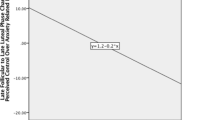Abstract
Retrospective questionnaires show cyclical variations in moods and behaviors across the menstrual cycle. However, results obtained from daily mood questionnaires are inconsistent. In the present study, which ran for 11 weeks, self-report measures of menstrual symptomatology, using the 8-factor Moos (1968, 1969 a,c) Menstrual Distress Questionnaire (MDQ), were investigated. The MDQ was administered under conditions that made the menstrual cycle a salient (retrospective questionnaire) or not a salient (daily questionnaire) part of the study. The study included women who were taking and not taking oral contraceptives. A 2×3 analysis of variance (with the two groups of women and three menstrual cycle phases as independent variables) yielded broad cyclical variations only in the menstrual cycle salient condition. When the menstrual cycle was not a salient part of the study, only the pain factor reached significant cyclical variation (p<.01).
A 2×3 analysis of variance (with the two types of questionnaires and three menstrual cycle phases as independent variables) indicated that for women not taking oral contraceptives the two questionnaires differed on pain (p<.01), concentration (p<.01), autonomic reaction (p<.05), and water retention (p<.01). Phase effects were significant on all factors, with largest cyclical variations in the menstrual cycle salient condition. A similar analysis for women taking oral contraceptives yielded fewer significant differences. These results suggest that questionnaires that make the menstrual cycle a salient part of the study may exaggerate possible cyclical variations in moods and behaviors.
Similar content being viewed by others

References
Edwards, A. L.Experimental design in psychological research. New York: Holt, Rinehart & Winston, 1950.
Englander-Golden, P., Willis, K. A., & Dienstbier, R. A.Intellectual performance as a function of repression and menstrual cycle. Presented at the American Psychological Association 84th Annual Convention, Washington, D.C., Sept. 3–7, 1976.
Englander-Golden, P., Willis, K. A., & Dienstbier, R. A. Stability of perceived tension as a function of the menstrual cycle.Journal of Human Stress 1977,3 14–21.
Gough, H. G. Personality factors related to reported severity of menstrual distress.Journal of Abnormal Psychology 1975,84 59–65.
Klaiber, E. L., Kobayashi, Y., Broverman, D. M., & Hall, F. Plasma Monamine Exidase Activity and Sex Hormone Concentration in Human Blood Plasma.Journal of Reproduction and Fertility 1972,29 447–450.
Moos, R. H. The development of a menstrual distress questionnaire.Psychosomatic Medicine 1968,30 853–867.
Moos, R. H. Typology of menstrual cycle symptoms.American Journal of Obstetrics and Gynecology 1969,103 390–402. (a)
Moos, R. H. Assessment of psychological concomitants of oral contraceptives. In W. Salhanic, D. Kinross, & R. VanDeweble (Eds.),Metabolic effects of gonadal hormones and contraceptive agents. New York: Plenum Press, 1969. (b)
Moos, R. H.Menstrual Distress Questionnaire Preliminary Manual. Stanford University, Department of Psychiatry, 1969. (c)
Parlee, M. B. The premenstrual syndrome.Psychological Bulletin 1973,80 454–465.
Rodin, J. Menstruation, reattribution, and competence.Journal of Personality and Social Psychology 1976,33 345–353.
Silbergeld, S., Brast, N., & Noble, E. P. The menstrual cycle: A doubleblind study of symptoms, mood and behavior, and biochemical variables using Enovid and placebo.Psychosomatic Medicine 1971,33 411–428.
Sommer, B. Menstrual cycle changes and intellectual performance.Psychosomatic Medicine 1972,34 263–269.
Williams, R. H.Textbook of endocrinology. Philadelphia: W. B. Saunders, 1974.
Author information
Authors and Affiliations
Additional information
The authors are grateful to Dawn Christie Burns and Ross Hodges for their help in data reduction.
Rights and permissions
About this article
Cite this article
Englander-Golden, P., Whitmore, M.R. & Dienstbier, R.A. Menstrual cycle as focus of study and self-reports of moods and behaviors. Motiv Emot 2, 75–86 (1978). https://doi.org/10.1007/BF00992733
Issue Date:
DOI: https://doi.org/10.1007/BF00992733



